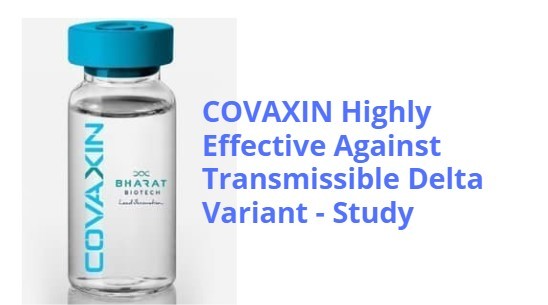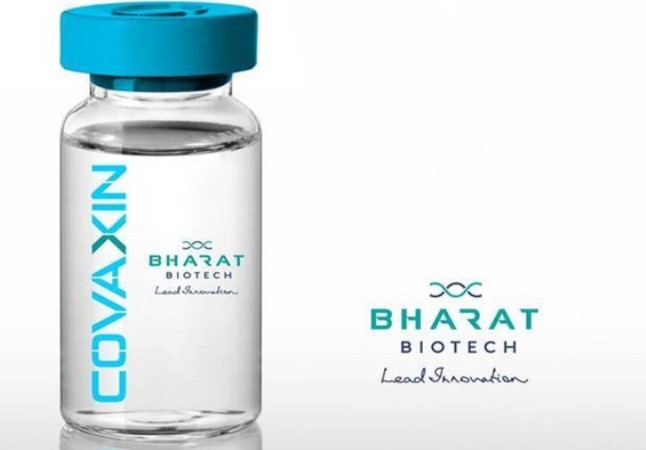In a recent study on COVAXIN effectiveness against highly transmissible delta variant, it established, the effectiveness of COVAXIN against the variants of concern. In a case controlled study published in The Lancet – multi-centric, hospital-based, case–control study between May and July 2021. Cases were severe COVID-19 patients and controls were COVID-19 negative individuals from 11 hospitals.
Vaccine effectiveness (VE) was estimated for full (2 doses ≥14days) and partial (1 dose ≥21 days) vaccination; duration between two vaccine doses and against the Delta variant. We used a random effects logistic regression model to calculate adjusted odds ratios (aOR) with 95% CI after adjusting for relevant known confounders.
The robust real-world effectiveness of the two vaccines against severe COVID-19 in India several months into the second wave of the epidemic with predominant circulation of the highly transmissible Delta variant with potential for immune escape suggests that the strategy for vaccination in the country is effective particularly in the background of high seroprevalence of SARS-CoV-2 IgG antibodies in most parts of the country.
This multicentric hospital-based study across 11 cities represents vaccine effectiveness at the national level, covering India’s large expanse and during the period of dominance of the Delta strain of SARS-CoV-2 in the country. The findings indicate an overall effectiveness of two doses
While the COVAXIN pre-print study in The Lancet Infectious Diseases, Devashish Desai and colleagues2 report the findings claims lesser effectiveness from their test-negative, case-control, vaccine effectiveness study of a whole-virion inactivated SARS-CoV-2 vaccine, BBV152, during the peak of the second wave of the COVID-19 pandemic in New Delhi, India, which was presumably driven by the delta (B.1.617.2) variant.
Future studies should be designed with the emphasis to evaluate protection against moderate-to-severe COVID-19
In a recent study which reported less effectiveness, we need to read carefully and interpret it, and to our knowledge, while the surge was driven by delta, positive patients were not tested for SARS-CoV-2 variants. The study Effectiveness of an inactivated virus-based SARS-CoV-2 vaccine, BBV152, in India: a test-negative, case-control study could not, therefore, definitively estimate the vaccine effectiveness against a specific variant, according to The Lancet
The study has some methodological limitations, such as absence of comorbidity data and no objective assessment of previous infection, as discussed by the authors. The decline in vaccine effectiveness against SARS-CoV-2 infection during a delta-driven surge in cases is neither surprising nor exclusive to inactivated SARS-CoV-2 vaccines including BBV152. The delta variant has high transmissibility, infectivity, and virulence, which causes severe disease.5, 6
These attributes might have contributed to a reduced vaccine effectiveness against symptomatic infections, which has been reported to be as low as 56% for other vaccines in multiple studies worldwide.7, 8
Furthermore, this study was conducted in a high-risk population with a high exposure to SARS-CoV-2 in a tertiary care hospital caring for patients with COVID-19, in the context of a massive surge in infections, with high test-positivity rates of up to 34%, which could have been the key factor for the observed reduction in vaccine effectiveness.
COVAXIN – offers protection against moderate and severe COVID-19
Although BBV152 might not be as effective against symptomatic infection by the delta variant as it was against the wild type, a more useful outcome of vaccination is the protection against moderate and severe COVID-19. Moderate-to-severe disease warrants hospitalisation and intensive medical care, and therefore puts strain on health-care systems.
Vaccination has been shown to protect against hospitalisation and death, even during the delta surge. This study does not provide evidence in this regard.
But, if one were to consider vaccine effectiveness studies for other inactivated vaccines which indicated a better protection against moderate-to-severe disease than infection, it could be presumed that BBV152 might also have a similar performance.
Future studies should be designed with the emphasis to evaluate protection against moderate-to-severe COVID-19 and to analyse immune correlates of protection, such as neutralising antibodies and antigen-specific T-cell response, against the wild type and the delta variant in BBV152-vaccinated individuals. This emphasis might provide evidence on the need for a booster dose, especially in populations with comorbid conditions.
Nevertheless, faced with the challenge of protecting as much of the population as possible, the ongoing vaccination drive should be continued as a public health intervention against SARS-CoV-2, along with strict adherence to other non-pharmacological interventions, particularly in the context of variant-driven surges.
The adjusted vaccine effectiveness against symptomatic COVID-19 after two doses of BBV152, with the second dose administered at least 14 days before RT-PCR testing, was 50% (95% CI 33–62).
The key message of the study is the reduced effectiveness of BBV152, even with two doses of vaccine, against SARS-CoV-2 infections attributed to the delta variant compared with the effectiveness against the wild type (77·8% [95% CI 65·2–86·4]) that was reported in the phase 3 trial.4
It is important to note that the vaccine effectiveness estimated was not against delta variant infections only, but against infections that occurred during the surge in SARS-CoV-2 cases dominated by the delta variant.5






